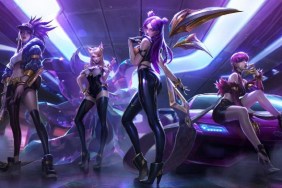This is not an article about ignorance. Despite being the largest consumer trade show in Korea, G Star is not well known by American gamers, let alone American journalists. And why would it?
The majority of the show focuses on mobile titles and MMORPGs, both of which typically demand a lot of rapid-fire one-finger touches. In the most electronically connected country in the world, the convention had nary a console in sight. And if you try searching for "G Star" in Google, the first hit is a clothing brand. Or maybe you'll find this laughably short description in Wikipedia.
The only Western influence came in the forms of Blizzard, no doubt due to Korea's prevalence and cultural acceptance of e-Sports, and EA FIFA Online safely nestled within the Nexon booth instead of the regularly glitzy Electronic Arts booth at E3. And the only Japanese presence was Nintendo, exclusively hawking their 3DS titles despite the Wii U releasing later this very month.
It was difficult not feeling over-privileged and a little smug. After all, us Americans are treated year-round to a nationwide tour of conventions with PAX, GDC, and E3 (to name a few), fully stocked with an extensive array of genres, developers, and peripherals. As I meandered through G Star's show floor, filled to the brim with more fantasy MMORPGs and baseball simulators than I could shake my fist at, my desire for innovation naturally wanted to burn everything in the convention center with the power of an epic rage-quit.
If just to add more oil to the fire, I was surrounded by throngs of Korean teenagers (about 100,000 in attendance) with similar short haircuts, similar fashionable outfits, and similar black-frame hipster glasses. In an effort to look like teen models from an outlet mall, they all seemed to blur into a single, conformist statement about their individuality. Booth babes, snapped exclusviely by male photographers with their Nikon cameras and Samsung phones, were flanked by female hosts, where at every booth they tried to out-talk and out-shout each other for the attention of swag-hogging fanboys. There I was, in a Persona 4 Golden T-shirt, ready to smash things on a whim.
But then I sat down, and thought about the repercussions of an American citizen going on a killing spree through a Korean game convention. Contemplating the possible causes for World War III, I calmed myself. I began to rethink what G Star was about and what relationship it could have to Western gamers. And then it dawned on me: G Star is simply the opposite of PAX. Not in a good versus evil way, but in "the different sides of the coin" way.
What stood out the most in the crowd at G Star is that I usually could not discern whether someone was a gamer or not. Apart from only a handful of cosplayers (all eighteen of them), most attendees were either wearing business suits or some urban mall fashion. In the States, gamers tend to stand out by wearing a T-shirt with nerdy quotes or video game logos. But here, anyone could be a gamer. There is no separation.
The casual space of mobile and the multiplayer space of PC are so dominant that the market becomes uniform and even "hardcore" by how much the fans care about them. It's not a crime to be serious about a League of Legends tournament, nor is it not a crime to only care about Bad Piggies. This is what video games look like when they're deeply embedded within a culture, when they're seen as just a part of life. That doesn't excuse, to my eyes, the lack of innovation and well-developed design concepts, but it doesn't seem the Korean video game audience particularly cares.
Could it be that I was peering into the future, a possible end-state, of Western game conventions? Sure, I both loathe and admire G Star, and I'm certain that there always be enough for me to love and hate no matter what E3 2035 looks like. But I don't think so.
There are too many gamers in the States who were brought up on a console, are unfazed by violent video games, and have been privileged to the widest range of video game genres to make G Star the foreseeable end. Even if the PC were the only platform available today, Steam alone would provide enough titles to prevent the G Star conclusion (some would say, apocalypse). And who is to say that Korea's video game scene won't change in the next 20 years?
Right now, though, Korea understands that their specialty in MMORPGs is its meal ticket to international success and clout in the industry. G Star may not have much relevance to Western gamers now, but give it a decade, and it may just turn into a well-known game convention around the world. Considering the ever increasing emphasis of mobile titles at Tokyo Game Show, this might happen sooner than you think.










